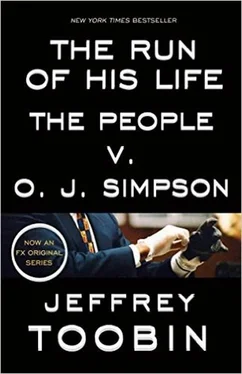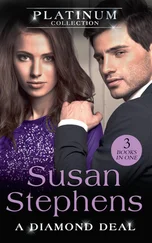The tapes issue thus quickly became one of daunting complexity-as were the parties’ motives. The judge went right to the heart of the issue when he asked, in chambers, “Is there a conflict for me to hear this issue?”
“Right,” said Clark.
“Which is a significant legal issue,” Ito continued, “because we may be talking mistrial.”
With the tapes in hand, the defense felt the best thing it could do was press on for a verdict in front of this judge and this jury. The prosecutors did not want to prompt a mistrial that might potentially, under the double-jeopardy clause of the Constitution, prevent a retrial, but Clark in particular had come to loathe Ito with a passion. By coincidence, right around this time Clark and I were chatting in the hallway and she launched into a lengthy tirade about the judge: “The worst judge I’ve ever been in front of-and the worst possible judge for this case. Totally intimidated by Johnnie, a total starfucker…” But she and the other prosecutors also realized that it was almost impossible to bring a new judge into such a complex case at this late date.
And then there was Ito. A decent man, he mostly wanted to do the right thing under the law (though it was far from clear what that was). He had come to have an almost schizophrenic reaction to the media attention that the case had brought him. True, at times he reveled in it. But at the same time Ito suffered at the many (and ever increasing) critiques of his performance. Now his wife was being dragged into the mess. The pressure nearly drove him to snap.
After devoting nearly the entire next morning, August 15, to listening in silence to Clark and Cochran’s rancorous arguments about how to handle the issue of his wife’s involvement, Ito made up his mind. Staring at his notes, he said, “When a concern is raised regarding a Court’s ability to be fair and impartial, it is not the actual existence of impartiality or partiality that is the issue. It’s the appearance.” Ito paused, gathering himself, the silence a reminder of how wrenching the experience had become for him. When he resumed, his voice was thick with emotion. “I love my wife dearly.” He struggled to collect himself. “And I am wounded by criticism of her, as any spouse would be. And I think it is reasonable to assume that that could have some impact. As I mentioned, women in male-dominated professions learn to deal with this. And those who are successful, I think we all observe, are tougher than most.” (Ito implied, winningly, that they are tougher than their husbands, too.) Ito did not recuse himself from the case-at least not yet. He said, in effect, that another judge should review the tapes and determine if Ito could still preside.
The entire courtroom then picked up and moved in a motley caravan up two flights to the courtroom of Judge James Bascue, the chief criminal judge of the superior court. Bascue assigned the case to Judge John Reid, in the courtroom next door. (There was a revealing moment in Bascue’s brief tenure on the case. Though famously tough on crime in ordinary circumstances, Judge Bascue couldn’t resist trying to banter a little with Simpson about football-striking, and distasteful, evidence of the effect of sports celebrity on middle-aged men.) Judge Reid, in turn, agreed to examine the tapes, and then sent the case back to Ito to continue the trial. This extraordinary merry-go-round-three judges in an hour, with the jury all the while sitting around and doing nothing-underlined just how anarchic the case had become.
The following morning, in an off-the-record session in Judge Ito’s chambers, the prosecution’s frustrations surfaced. Sitting around Ito’s desk with the defense attorneys, Darden said, “Judge, I haven’t vented in a long time, and I’d like to vent.” He complained that the judge had interrupted and embarrassed prosecution lawyers in front of the jury. “We don’t like that,” Darden said. With the issue of Ito’s recusal still hanging in the air, it looked like Darden was trying to intimidate the judge. After Darden’s tirade, the defense lawyers bolted out of chambers and asked to go on the record in open court. There, Shapiro recounted the episode and said he was going to complain to the state bar. Such a remedy might have been excessive, but Shapiro’s complaint about Darden certainly did have merit.
Now it was Darden’s turn to become nearly unhinged. “Your Honor,” Darden said, voice quavering, “I’m so offended at Mr. Shapiro’s remarks-remarks that I’m sure are being fed to him by Mr. Cochran-I’m so offended by those remarks that I would rather not stand at the same podium at which he stood a few moments ago.” Like a child fearing cooties, Darden kept his distance from the wooden stand. “Now, if Mr. Shapiro or Mr. Cochran want to refer me to the state bar, fine. Because when this case is over, I’m going to be referring the defense attorneys to the United States Attorney’s Office.” Cochran laughed audibly at this preposterous suggestion. “And he chuckles now,” Darden went on, “but will he be chuckling later on? It won’t be so funny later on. They don’t know everything that I know.”
One can scarcely imagine more reckless behavior by a law enforcement official than Darden’s empty threats (based on secret information) to report an adversary for a crime. Yet the defense did not even complain, because Darden was so obviously just posturing. (Needless to say, Darden never reported anything to the U.S. Attorney’s Office. Notwithstanding the questions about the ethics of the defense lawyers in this case, no one could say that they had committed any federal crimes.) And all this distress for the prosecution came even before the judge decided when, or if, to play the tapes in public.

Cochran kept the pressure on. His experience told him that organized political pressure to release the tapes had to accompany general public outrage about them. When Cochran’s client Michael Jackson was under investigation in February 1994, the lawyer had orchestrated a news conference of black ministers to call on Gil Garcetti to conclude his investigation of the singer. On August 28, 1995, much the same coalition was reassembled-this time to call for Judge Ito to release the Fuhrman tapes to the public. The heavily attended media event was spearheaded by Danny Bakewell, head of the Los Angeles civil rights organization known as Brotherhood Crusade. (This was the same Bakewell who had, less than a year earlier, bestowed on Cochran his organization’s annual award, hailing the lawyer as “a tireless warrior against those who would deny justice for all.”) Commenting on the Fuhrman tapes, Bakewell predicted dire results if the tapes were not released. “This community is a powder keg,” Bakewell said, “capable of repeating the actions of 1992”-that is, the riots that had followed the acquittal of the LAPD officers who beat Rodney King. Bakewell’s rhetoric was pure racial extortion: Release the tapes-or else.
The political maelstrom left Ito little choice when the issue was finally posed to him the next day, August 29. The prosecution had entertained a vain hope that Ito would at least decide the tapes issue without first playing them in public. But when weighing that decision, Ito addressed the general outcry about the tapes directly. “I think that there is an overriding public interest in the nature of the offer that you are making,” Ito told the defense in a hearing before the television cameras but outside the presence of the jury, “and I don’t want this Court to ever be in a position where there is any indication that this Court would participate in suppressing information that is of vital public interest.” The judge allowed the defense to play the portions of the tapes they wanted the jury to hear. With that decision by Ito, all of the defense work-from Schiller’s leaks to Bakewell’s threats-had paid off.
Читать дальше













